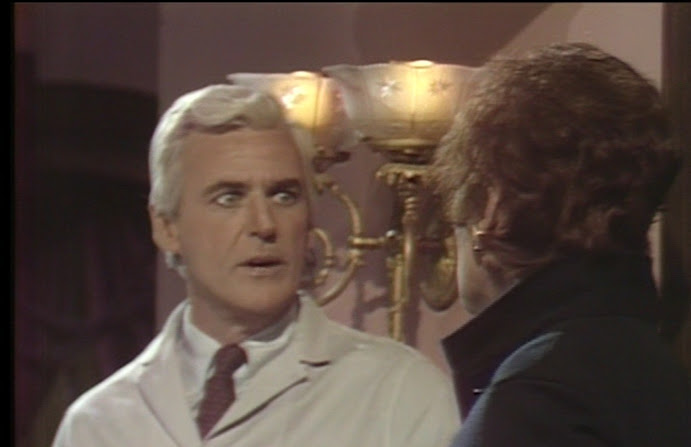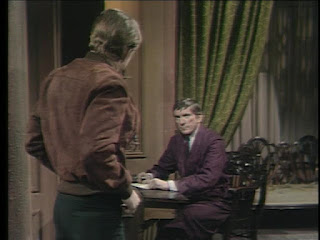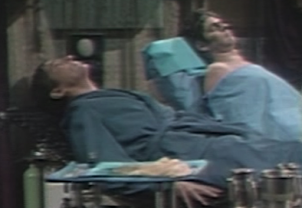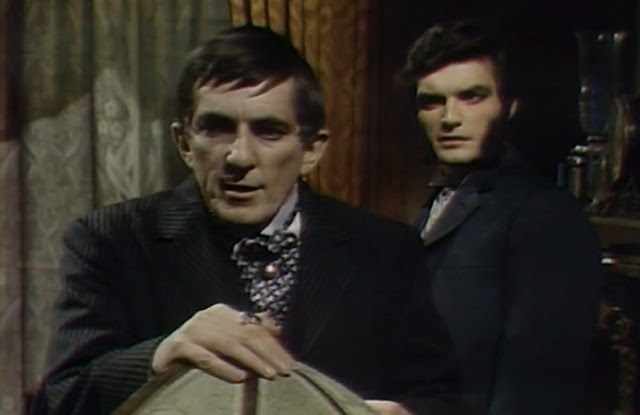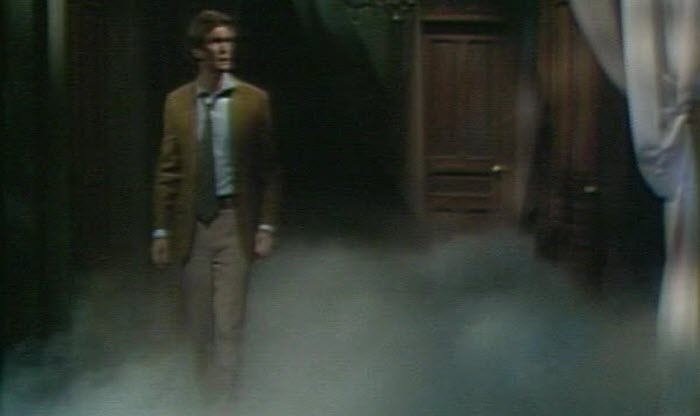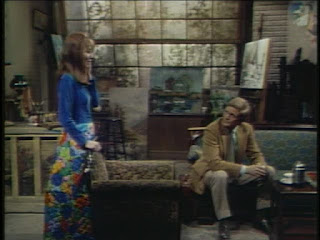Barnabas knows that ultimate happiness is right around the corner because his best friends do all that they can to talk him out of it. Eric Lang: Addison Powell. (Repeat; 30 min.)
Lang relates the dream curse to Julia on the eve of The Experiment as she tries to talk him out of it. Meanwhile, Barnabas relates his instructions to Willie on the eve of The Experiment as he tries to talk him out of it. Across Collinsport, Angelique, tired of the moralizing, stabs a voodoo doll of Lang and then probably takes a long, well-deserved bubble bath.
One of the great things about Ghostbusters is its use of science to address the supernatural. It would be convenient to say that this is something that started with the novel of Frankenstein, except that the process only hinted at in the book is as much alchemical as it was laboratory grade. In exploring the dichotomy between the two methods of describing and controlling the universe, Dark Shadows generally comes down on the side of the supernatural, except when it doesn’t, and it doesn’t with surprising regularity. Science makes more appearances than you would think. Peter Guthrie is no witch doctor. Julia begins the show by literally seeing the supernatural through a microscope. The heroes of 1795 at least assert a preference for scientific thinking. And if scientific thinking is not always the answer, it certainly has a seat at the séance table. Julia works with Angelique to combine bio chemistry and black magic to help Barnabas in 1897. The entire existence of parallel time is well-founded in vaguely articulated pseudoscientific mumbo-jumbo recited by Stokes with incredibly precise ambiguity. You know, science. Along with Cyrus Longworth and a side-trip to 1840, via a chronoporting staircase well-founded in time honored principles of total scientific illiteracy. But, Dark Shadows is under no obligation to be scientifically literate. It doesn’t have to worry about Isaac Asimov clutching his pearly muttonchops as he watches it, kvetching that “It's no Space: 1999.”
For Dark Shadows, science may simply be magic in lab coats, but that’s not all. It’s the Resistance. It’s often the sole force that man has against the new world of ancient gods and monsters. Although it is carefully protected from resembling reality, it still exists to troll hoity-toity magic users and level the playing field for the rest of us. And of course it has to be mad science. Because regular science is too boring and largely exists to give everyone reasons why they can’t have any fun.
Eric Lang is my kind of scientist. Just imagine him instead of Anthony Fauci. I’m sure somehow Covid would have been cured by now. Admittedly, we would all have giraffe heads grafted on to us. Which would have absolutely nothing to do with curing Covid. But I have every confidence that Eric Lang was also on the board of the Collinsport Community Playhouse and was itching to do a modified version of some Ionesco, a playwright he admired for his gritty, hard-hitting realism. After that controversial, all-nude production of Darling of the Day, he had to play it safe. Every year for a fundraiser, they would do a haunted house. Which was actually the only month out of the year that Lang would simply take down the schmattas covering everything in his home and show off his work in all its glory.
All seriousness aside, the episode crackles with more pure fun than a Chick-fil-A hijacked by RuPaul and Steve Shives, open for biz and spiking the lemonade with bourbon on a Sunday near you. It begins with Lang trying to logic his way through the dream curse, and knowing that we’ll be saying goodbye to Dark Shadows’ most passionate showman, Addison Powell, it’s a glorious monologue that hovers somewhere between sobriety and appropriate sensationalism. As these people share nightmares, it’s the closest the program comes to presenting the characters presenting their own individual horror TV series. It’s as if they, themselves, are producing a meta-Dark Shadows.
Lang tries to persuade Julia that there’s nothing inordinately dangerous to injecting the soul of Barnabas into the body of Adam, you know, now that all of the heads have been sawed-off, reattached, and Roger Davis still has his face. Hearing this, Julia has her doubts and says that she might prefer if Barnabas simply went back to being a vampire.
Yeah, you heard me.
Julia eventually emerges as the voice of conscience and common sense for Barnabas. You know, over a year from now. But today she has one black-stockinged leg in the bold future of 1897 and another one still in the lab, trying to chemically shrivel Barnabas into a future Don Post bestseller. Like in that episode of Next Generation where they kept aging Dr. Pulaski by taking off layer upon layer of Diana Muldaur’s make-up.
I kid, I kid. Better than Crusher, sez me.
But I have to question the moral compass of anyone who would put the inevitability of a serial killing Lord of the Undead, capable of spreading a vampiric pathogen that could decimate the human race if well-shaded and unchecked, above a wacky experiment that will probably just end in nothing but a crackle, a burning scent, some shrugs, and then Lang, Julia, and Willie splitting the contents of Barnabas‘s wallet three ways at TGI Friday’s, which, knowing what a cheap SOB he was, will barely cover the cost of the seven layer dip and that Ultimate Megarita that is how Julia spells r-e-l-I-e-f on any day ending in ‘Y.’
Why, indeed?
Barnabas responds with a withering cattiness worthy of Count Petofi. He opines, “That IS a shame,” sighs, and desperately tries to secure his fortune by writing a questionable letter instructing the family to hand over all of his possessions and the Old House to a “cousin from England.” Yeah, like they’d ever do that.
But Willie continues his campaign of simpering instead of doing what he should, which is quickly finishing a paint-by-numbers portrait of Robert Rodan in Georgian drag to sneak onto the wall of the drawing room as if it were yet another portrait of an incestor that “had been there the whole time.“ You know, the minimum litmus test that Roger and Liz need to fork over priceless real estate to a fancy-lad stranger. Hey, if it worked for Georges Baker and Lazenby, why not here?
Just for a moment, I want you to picture that version of the show. Picture a Dark Shadows where the experiment worked, and Jonathan Frid has to loop in the dialogue for Robert Rodan as if he’d just emerged from Boris Balinkoff’s mind-transplant device. For the rest of the series.
But all this fear over the experiment, and a preference for Barnabas to be a vampire again, has a disturbing subtext. People in abusive relationships tend to gravitate back to further abusers because a familiar love is preferable to taking a chance on a happy future. Although it’s unexpected, that is a truth reflected here by both Willie and Julia.
However, Barnabas is willing to literally change his mind, so that’s next in line. “Barnabas, the experiment’s still free,” Lang might have reminded him, before adding, “take a chance on me.”
Yes, I once directed Mamma Mia. Or as I called it, “A Cry for Help.“ And those lambs are still decidedly screaming, Clarisse.
Barnabas is so ready for the process that he even puts on a blue bathrobe for the experiment. Like Red Sonia in that armor that I’m sure is just as protective, I assume it’s for “freedom of movement“ but I still feel like the old boy is being exploited.
Actually, after seeing him manfully clad in suits, capes, jabots, ascots, tights, and various kerchiefs for a year, The semiotic impact of that blue bathrobe conveys the incredibly human vulnerability of Barnabas in a way that is unparalleled across the series. Either that, or he’s waiting for a Jean Shepherd narration to start describing his long-standing battle with Lang’s idiosyncratic furnace as Julia once again unsuccessfully attempts to get Willie to eat meatloaf.
Well, there are no Bumpus hounds to devour the Ham of Progress as Lang charges up the ozone of electric sex to begin the transfer. But don’t think the supernatural will go down without a fight. With cosmic inevitability, Willie goes to Collinwood to personally hand Angelique the precise piece of information she needs, the letter about “Adam Collins,“ at precisely the right time for her to get out her trusty Eric Lang Mego voodoo doll and throw what was a sober exploration of scientific inquiry into total chaos.
And for a moment, an important moment, all of the wackiness stops. We see Barnabas, our friend and hero, screaming in a degree of pain that is suddenly and uncomfortably real. We see him worry. We see him fret. But television usually stops short of showing a character, destined to live, experiencing a pointless and sadistic agony. And Lang is experiencing it as well. Maybe we could say it’s tantamount to the pain of childbirth, which is what the scene is about, but this is not such pain.
This is sadism. And it is sadism from a witch. A creature of darkness. A creature of anti-science. Someone whose existence knows only the spectrum of literal hellfire or the blazing execution stake representative of human justice. How dare he be cured? More pointedly, how dare he be cured by someone other than she? In that attack, we get a full-spectrum view of the quintessential struggle for the human identity. No, really. Male versus female. Science versus religion. Reason versus emotion. Fear versus informed optimism. What is at stake? Literally, the human mind and, if it exists, soul.
No answers, except that one side seeks to use nature to control nature. One side wishes to punish the attempt to steal what was her fire, exclusively. Science will, as we will learn, win the day, but not without sacrifices. Adam will live, as will Barnabas. And no matter how big Angelique’s Twinkie, for one day at least, Eric Lang, Barnabas Collins, and Julia Hoffman had the guts to cross the streams.

